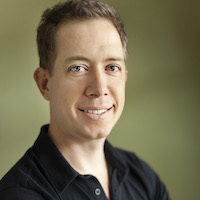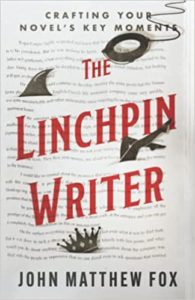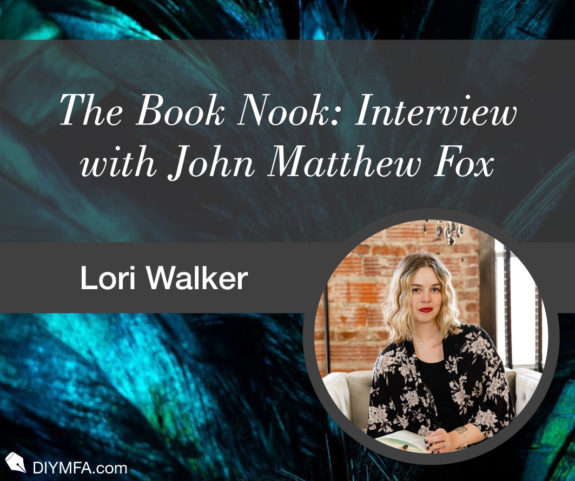Today I had the privilege of interviewing John Matthew Fox, author of The Linchpin Writer, a book on creativity. Since this is a craft book, the bulk of this interview will focus on applying his advice, which I think you will find extremely useful to your own writing projects. I know I found it useful for my own writing.
I hope you enjoy this interview!
About John Matthew Fox
John Matthew Fox helps authors write better fiction. He is the founder of Bookfox, where he provides editing and creates writing courses, and his books include The Linchpin Writer: Crafting Your Novel’s Key Moments and the story collection, I Will Shout Your Name (Press 53). He gives writing tips on Tiktok and Instagram.
About The Linchpin Writer: Crafting Your Novel’s Key Moments
In every novel, there are pivotal places that can make or break a book. Write them well, and you’ll have your readers begging for a sequel. Write them poorly, and your book will get scathing reviews and sell only a handful of copies. These pivotal places are “linchpin moments,” and in this book, you’ll learn how to nail these moments.
Based on real advice from editing hundreds of novels, John Matthew Fox guides writers through the process of creating a novel that soars in the reader’s imagination. After reading this book, you’ll be a better storyteller, a better self-editor, and a better writer.
In this book you’ll learn how to:
- Flood your readers with strong emotions
- Create memorable beginnings and endings
- Describe characters for the first time
- Make readers swoon in romantic scenes
- Kill off characters (without enraging your readers)
- Harness the element of surprise
Interview with John Matthew Fox
Lori Walker: First off, I’d love to hear a bit about how you became a writer. What is your journey as an author?
John Matthew Fox: I was a professor of writing for a decade, but gave it up to take care of my twin sons when they were born. While trying to figure out what my next step would be, I put in a lot of hours writing (during naptimes) and ended up publishing first my short story collection, I Will Shout Your Name, and now this book of advice for writers, The Linchpin Writer.
LW: What does a typical day of writing look like for you?
JMF: I wake up at 5:30 and write for an hour before shuttling the twins to school. Most of the rest of the day is spent editing other people’s books, offering boot camps for writers, and coaching writers.
LW: What is the number one mistake you think beginning writers make and how can they avoid it?
JMF: They don’t put in enough hours. The writers I know who are successful write for five hours a day. I don’t know how they do it. It’s difficult for me to write for an hour or two before working on Bookfox.
Plenty of writers are intelligent. Intelligence is spread out quite generously in the writing community. So it really comes down to hours in the chair. A mediocre writer who spends double the time writing ends up being more successful than a talented writer who just can’t get his butt in the chair.
LW: How can your advice in Linchpin be adapted for writers of creative nonfiction?
JMF: Creative nonfiction uses all the techniques of fiction, so I would say almost everything in the book works for them.
I mean, in the book I’m talking about techniques for dialogue, description, chapter endings, death scenes, sex scenes—which creative nonfiction or memoir writers use in extremely similar ways to fiction writers.
LW: Which of the linchpin moments that you cover would you say is the most important for writers to focus on? And what’s the best nugget of advice you can give for that moment?
JMF: Oh, you’re making me choose just one! How torturous.
But I would say nailing the ending is the most important part of your book. A wobbly ending means that person won’t really remember your book and won’t recommend it to anyone.
A good technique for an ending is to make it bittersweet. You don’t want an ending with complete and utter despair, but most books shouldn’t have a 100% happy ending, either.
It’s best to have the protagonist succeed in one thing, yet fail in another. It feels more honest and more like life itself.
You have to ask yourself: what’s the overall tenor of my ending? Is it all droopy and tragic? Does it end with magical rainbows and pots of gold? And then tweak the storyline to have a precise overall effect on the reader.
LW: A lot of the advice in Linchpin involves studying how other writers do it, which requires reading in a different way than you do for enjoyment. How can writers read more deeply so they can dissect and analyze books?
JMF: The trouble with most writers is that they’ve been trained to read like English majors. That’s because most of their training in reading books has been from English teachers, who were trained as English majors.
But how an English major reads is often diametrically opposed to how a creative writer reads. The English major is looking for the secret beneath the prose. They’re looking to crowbar the story open and extract some “themes” they can use in a paper. They’re looking to enrich themselves and appear intelligent at the expense of the author.
Reading as a creative writer requires valuing the author’s intent. It requires studying how they made you feel an emotion. It requires borrowing from their dialogue techniques and description techniques. It requires you to figure out how they created an effect in you, and then mimicking them.
In one of the chapters of the book I talk specifically about strategies to help authors create emotion on the page. It’s the most fundamental aspect of fiction writing, and yet writers don’t talk about it enough. I don’t think an English major would ever read looking for the emotional effect upon the reader, but it’s the best way to read as an author.
LW: At what point in the process should writers begin focusing on these linchpin elements? I know one of them specifically refers to the second or third pass, but are they things writers should keep in mind from the beginning or only upon revision?
JMF: You should keep them in mind from the beginning. You won’t achieve them perfectly in the first draft, because no one ever does. But you’ll write a better first draft if you keep them in mind.
And of course, the book is super helpful as a revision guide as well. It just points out all these areas in your novel that you want to revisit and shape and reshape.
Ultimately, Goodreads has your answer: about half of the reviews of the book mention it being helpful as a drafting guide, and the other half are using it as a revision guide.
LW: In addition to lessons on reading and writing, Linchpin also holds a lot of advice on living the writing life. Were there any tips about the writing life you wanted to include, but had to leave out? If so, what were they?
JMF: I think every writer is three or four writers. You change radically over the course of your career. Perhaps you start off writing for the sake of money and fame, and then you change into someone who writes trying to get the approval of critics. Maybe you start in one genre and then end up switching to a completely different genre that you never imagined you would try.
I know a lot of writers that end up giving up the novel dreams and slide into writing-adjacent careers—editing, ghostwriting, copywriting, literary agent, publishing, writing entrepreneur, etc.
In the end, I think young writers need to understand how their current goals as a writer are likely to shift radically over the next ten or twenty years.
For instance, for a long time, I wanted to write high literary books. But I’ve softened and changed, and now I want to write more accessible books. Think of the difference between Cormac McCarty’s Blood Meridian and No Country for Old Men. It’s almost a completely different author.
Be nimble. Be agile. Be able to pivot and to swerve. If an opportunity comes, write hard at it. But also understand when you’re banging your head against a wall and find an alternative route to get to the writing life.
LW: A lot of authors are creating playlists to accompany their books, but this being a reading column, I’d like to know what your “reading playlist” is. I know The Linchpin Writer is a craft book, so maybe what are some of the top books that you recommend to people?
JMF: The Courage to Write by Ralph Keyes is a book I recommend to everyone. It’s such a helpful, thoughtful, well-researched book dealing with all the hang-ups and psychological foibles of writers.
I would wager it’s impossible to read that book and not walk away with your fingers itching and your brain on fire, ready to sit at the keyboard and roar.
If you decide to check out the book, we hope you’ll do so via this Amazon affiliate link, where if you choose to purchase via the link DIY MFA gets a referral fee at no cost to you. As always, thank you for supporting DIY MFA!

Lori Walker is the Operations Maven at DIY MFA. Though she’s fallen off the wagon as a writer, she’s hoping to return to writing essays (perhaps even a novel!) through her involvement with DIY MFA. She is also Launch Manager, Web Editor, and Podcast Producer for DIY MFA and a Book Coach. She resides in Smalltown, Oklahoma, with her husband and their cat, Joan Didion. You can follow her on Instagram at @LoriTheWriter.







